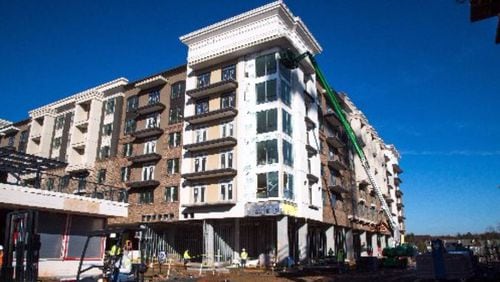If you can afford the down-payment and you’re going to stay a few years, experts say the math is pretty clear: it’s generally cheaper to buy a home rather than rent.
But the equation in Atlanta has been shifting.
Atlanta, a metro area that historically has been dominated by homeowners, has seen a dramatic surge of apartment construction the past decade – along with a steady flow of young professionals, many of whom are comfortable with renting.
And the variables are changing – especially for first-time buyers.
Not that rents are dropping, rents throughout Metro Atlanta are up an average of 2.4 percent during the past year, with the median two-bedroom at $1,170 a month, according to Apartment List.
All 10 cities tracked by the company in the region have seen rents rise, according to the San Francisco-based online rental site.
But home prices are rising faster.
The median home price in metro Atlanta has climbed 5.9 percent, according to Re/Max Georgia. The hike is even more pronounced in places where the most affordable homes might be.
For instance, the median price of a home in DeKalb has climbed 10 percent in the past year, Re/Max said.
More crucially, inventory – that is, the number of homes listed for sale – has been dwindling. That pushes prices higher, but also simply makes it harder for a prospective homebuyers to find what they want.
According to research done by Re/Max for the AJC, sales have fallen for homes that cost $175,000 or less.
For example, in September, there were 1,749 sales. During the same month a year ago, there were 1,889.
If you can share costs with a roommate, that further tilts the equation toward renting, said Cheryl Young, a senior economist for Trulia, a real estate site.
"Starter home inventory dropped 20.4 percent year over year," she said. "Low inventory and stiff competition for house hunters may be enough of a deterrence for renters … to stay put if the margin between renting and buying is slim."
As a destination for companies and ambitious young people, Atlanta has historically sold itself on high quality of life and low cost of living.
But its affordability has been waning – at least compared to its potential rivals in the southeast, according to Abodo, which lists more than 1 million rentals: Atlanta is the 17th most expensive city to rent in, but Atlanta's most often-mentioned competitors for business, Charlotte and Dallas, are cheaper places to rent.
In the South, only Miami is more expensive for an apartment, said Abodo.
For both apartments and single-family homes, there are two ways to slow price hikes, said Svenja Gudell, chief economist for Zillow: One is a recession, the other is to build more homes.
Median rents for a two-bedroom apartment
Tops in the nation:
San Francisco, $4,285
New York City, $3,293
San Jose, $2,766
Boston, $2,759
Washington, DC $3,278
Source: Abodo
Median rents for a two-bedroom apartment
Tops in the Southeast:
Miami, $2,434
Atlanta, $1,906 (city only, not metro area)
Nashville, $1,570
Dallas, $1,599
Austin, $1,443
Raleigh, $1,305
Orlando, $1,243
Source: Abodo
About the Author







